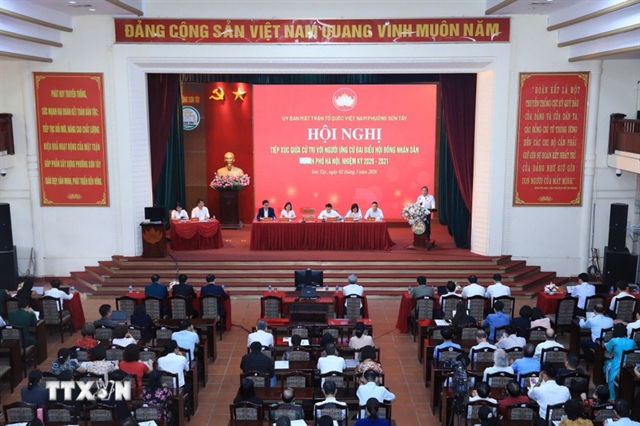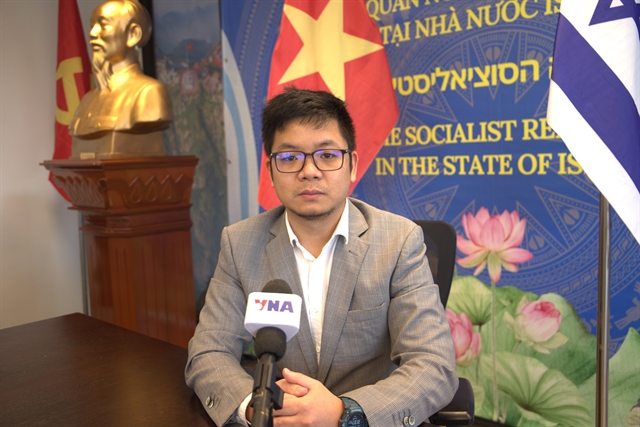 Business Beat
Business Beat

From October 1 lenders including banks will not be allowed to provide medium- and long-term foreign currency loans to businesses to pay for imports. Many market observers said this is the State Bank of Việt Nam’s final step in its fight against dollarisation.
| ||
| From October 1 lenders including banks will not be allowed to provide medium- and long-term foreign currency loans to businesses to pay for imports. — Photo cafef.vn |
Thiên Lý
From October 1 lenders including banks will not be allowed to provide medium- and long-term foreign currency loans to businesses to pay for imports.
Many market observers said this is the State Bank of Việt Nam’s final step in its fight against dollarisation.
Experts said the anti-dollarisation campaign has been on the right track.
The level of dollarisation in the economy has been steadily declining in recent years.
According to the National Finance Supervision Council, as of the end of May last year outstanding loans in the đồng amounted to 91.9 per cent of the total. The financial statements of some banks show the ratio of their foreign currency deposits to total deposits dropped sharply in the first half of this year.
For the three large State-owned banks, Vietcombank, Vietinbank and BIDV, they slid by US$500 million.
Vietcombank’s foreign currency deposits decreased by $316 million to $5.83 billion though total deposits increased by 8.6 percent to VND870.86 trillion ($37.37 billion).
Experts attributed the success in the fight against dollarisation to the central bank’s smart policies like paying zero per cent interest on dollar deposits and ensuring there is no foreign exchange volatility.
Indeed, the domestic and overseas finance markets have in recent times been volatile, and the đồng has been one of only two currencies in the region along with the Thai Baht not to have depreciated against the greenback amid the US-China trade war and the relentless depreciation of the Chinese yuan.
The stability of the đồng has contributed to decreasing demand for the dollar as people prefer to hold the currency and deposit it in banks due to a huge gap between interest rates on it and the dollar.
Banks pay nearly 9 per cent on đồng deposits while the rate on the dollar is zero.
Though the central bank recently cut key interest rates by 0.25 percentage points deposit interest rates have remained steady.
The gradual elimination of foreign currency loans by the SBV is necessary and consistent with the government's anti-dollarisation roadmap.
Ending foreign currency lending will minimise distortions in the foreign exchange market.
Experts said with the country integrating increasingly deeply into the global economy preventing dollarisation is key to minimising impacts caused by volatility in the outside world.
Both businesses and banks said they have been making preparations for the time when dollar loans would no longer be given.
Investors eye pawn market
In January 2017 the Mekong Enterprise Fund III Ltd managed by Vietnamese private equity firm Mekong Capital inked an investment deal with the Hà Nội-based pawn shop chain F88.
This was the third investment by the US$112.5 million fund since its launch in 2015.
The value of the deal was not disclosed but was believed to be an eight-digit figure.
MEF III, which focuses on investments in consumer-driven businesses such as retail, restaurants, consumer products, and consumer services, targets investments of $6-15 million.
Last November F88 also successfully raised investment from European fund Granite Oak.
Without disclosing financial details about that either, F88 said the investment valued it at nearly VNĐ1 trillion (US$43.5 million).
Founded in 2013 F88 pioneered the commercialisation of pawn services in Việt Nam. It also provides loans for diverse assets such as cars, motorcycles, mobile phones, laptops, and jewellery.
With this new investment the company plans to expand from the existing 45 pawn stores in HCM City to 300 across the country by 2021.
The pawn industry has attracted great interest from funds and companies, particularly foreign.
Acknowledging the huge potential of the Vietnamese pawn market, in 2015 John Galt Ventures of the US founded Camdonhanh, Việt Nam’s first online pawn shop, which ushered in competition for traditional pawn shops and even finance companies.
Thai financial firm Srisawad Corporation acquired the Finance Leasing Company I (ALC I) from the Vietnam Bank for Agriculture and Rural Development (Agribank) at an estimated VNĐ523 billion (US$22.45 million) and expanded its pawnshop chains to many provinces and cities including Nghệ An, HCM City, Bình Dương, and Cần Thơ.
The Mekong Capital Fund said the Vietnamese pawn market is dominated by traditional pawn shops, which number more than 30,000, indicating the great potential of the market and high demand for consumer loans.
Analysts said the demand for consumer credit is growing day by day but consumer credit channels are not keeping pace.
It is estimated that demand of loans for buying and repairing houses accounts for 50 per cent, autos and motorbikes for 15 per cent, and education, tourism and health care for 3 per cent.
Business Times newspaper estimated in a report that Việt Nam has 47 million people without access to official financial intuitions including banks due to various reasons.
Thus, even if each of them wanted to borrow only VNĐ10 million, the size of the market would be VNĐ470 trillion (US$23.5 billion), it said.
Pawn shops have a big edge over credit institutions in that people always have demand for money but the latter require them to go through many complicated procedures first.
Customers are normally people whose ability to assess and manage risk is low but need money to run their life. This makes them easy targets for pawn shops, which provide loans against low-value assets such as cars, motorbikes, mobile phones, and laptops.
The mortgagor can get their asset back after repaying principal and interest to the pawnbroker.
If the borrower fails to do so within an agreed time limit, the pawnbroker can sell the asset to recover the amount due.
Establishing a finance company is a complex task whereas it is quite easy to open a pawn shop.
Interest rates charged by pawn shops are as high as or more than at finance companies, ranging from 8.1 per cent to 12 per cent per month. VNS




